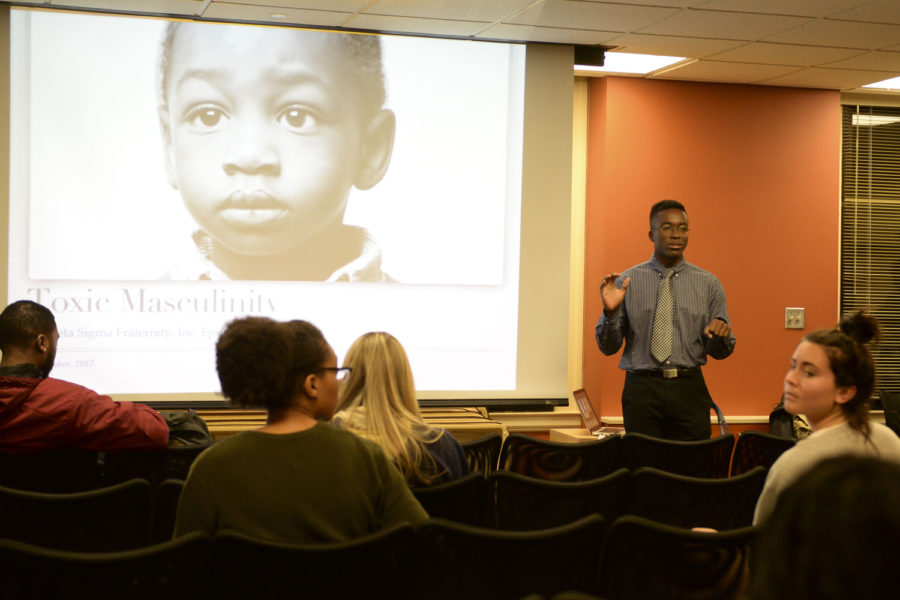Gabby Yearwood said he tells people all the time he wasn’t born a feminist.
Toxic forms of masculinity impacted his own life as a youth, he said. But going to college helped undo his preconceptions that cultural constructs had taught him — such as his aversion to gay people.
“I was homophobic, sexist. I said derogatory things about people,” he said.
Yearwood — a socio-cultural anthropology professor at Pitt — has since shed these notions he held as a young person. He was a featured guest at an event Monday evening on the sixth floor of the William Pitt Union called “Toxic Masculinity.”
About 20 people attended the event, which the Epsilon Kappa Chapter of the Phi Beta Sigma fraternity hosted. The event involved an open discussion among fraternity members and attendees that addressed the societal expectations placed on men, especially black men.
The fraternity members mostly led the discussion, with some comments made by outside attendees. Yearwood commented on the topics and issues brought up in the dialogue and identified cultural themes and patterns.
Yearwood defined healthy masculinity as men having the freedom to not have to subscribe to certain mainstream ideas of masculinity that focus on strength and dominance — traits the event focused on as characterizing toxic masculinity.
“Not everybody wants that, not everybody is that. Not everybody desires that even if it comes with power and wealth. They may want to be a stay-at-home dad,” he said.
According to Yearwood, the event covered important topics that investigate where these men are at in their lives as black individuals.
“It discussed what it means for these young guys to talk about themselves and where they are in their lives, trying to understand themselves and the expectations, being able to reflect a little bit on their own youth,” he said.
One member of the audience spoke up about his experience as a sophomore in high school. He said he was in the backseat of a car with another black friend while his white friend was driving. When cops pulled them over, he said the cops questioned the passengers even though they were just sitting in the back.
“That’s when I realized I was different, and realized that there’s a difference between being a man and a black man,” he said. “We weren’t doing anything, and we still got questioned.”
Yearwood said, as an anthropologist, he picks up on themes and patterns like those presented in the audience member’s anecdote.
“The commentary about being black is really about experience with racism and not really an experience with race,” he said. “A lot of black scholars define blackness by that experience with racism.”
The fraternity members opened the discussion with a PowerPoint presentation asking the audience questions. A number of audience members raised their hands to respond to the question “When did you become a man?” and responded with answers such as “moving out” and “being responsible.”
First-year engineering major Imani Montilla, who attended the event, said toxic masculinity continues to exist because different factors in everyday life allow it to thrive.
“I think the cause involves a community component contributing, others supporting it, and then there’s also the media, and seeing it validated in other people,” she said.
Montilla said she thinks when people express their masculinity in a toxic way it’s usually unconscious.
“I feel like a lot of time when people say toxic stuff, they don’t mean it to be rude or say it to be mean necessarily,” she said. “But we have the chance to respond by challenging them and asking why they said what they said to get them to stop and think.”
Hannah Wrigley, a junior studying pre-law, said she defines toxic masculinity as being physically aggressive to the point where it can hurt others.
“When a lot of people were describing what toxic masculinity is, it’s like, being physical, so I think that when that turns into violence it becomes toxic,” she said.
Wrigley said toxic masculinity is not something that solely needs to be addressed by men but by society as a whole.
“I think it’s a result of our culture, so I think everyone needs to change in order for it to change,” Wrigley said. “We can’t look at it as such an individual thing.”


